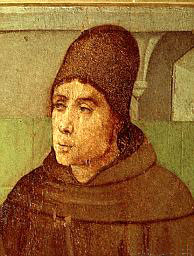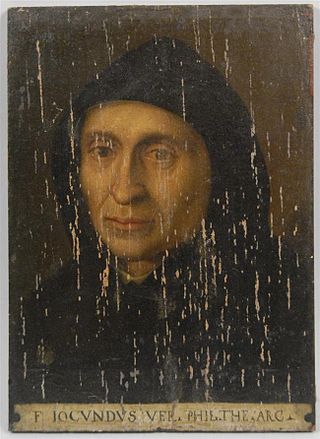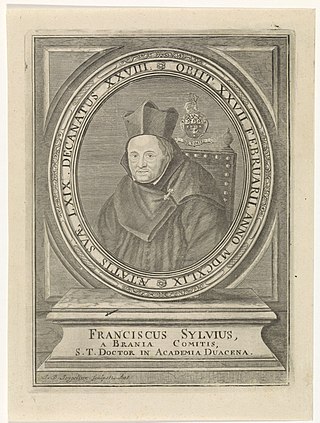
Gennadius II of Constantinople was a Byzantine Greek philosopher and theologian, and Ecumenical Patriarch of Constantinople from 1454 to 1456. He was a strong advocate for the use of Aristotelian philosophy in the Orthodox Church.
In logic and formal semantics, term logic, also known as traditional logic, syllogistic logic or Aristotelian logic, is a loose name for an approach to formal logic that began with Aristotle and was developed further in ancient history mostly by his followers, the Peripatetics. It was revived after the third century CE by Porphyry's Isagoge.

The Summa contra Gentiles is one of the best-known treatises by Thomas Aquinas, written as four books between 1259 and 1265.
Henry of Ghent, also known as Henricus de Gandavo and Henricus Gandavensis, was a scholastic philosopher who acquired the nickname of Doctor Solemnis.

Jacques Davy Duperron was a French politician and Roman Catholic cardinal.

Bernard Joseph Francis Lonergan was a Canadian Jesuit priest, philosopher, and theologian, regarded by many as one of the most important thinkers of the 20th century.

Scotism is the philosophical school and theological system named after John Duns Scotus, a 13th-century Scottish philosopher-theologian. The word comes from the name of its originator, whose Opus Oxoniense was one of the most important documents in medieval philosophy and Roman Catholic theology, defining what would later be declared the dogma of the Immaculate Conception by Pope Pius IX in his constitution Ineffabilis Deus on 8 December 1854.

Giovanni Giocondo, O.F.M., was an Italian Franciscan friar, architect, antiquary, archaeologist, and classical scholar.

John Capreolus, in French Jean Capréolus and in Latin Johannes Capreolus, was a French Dominican theologian and Thomist.

The Summa Theologiae or Summa Theologica, often referred to simply as the Summa, is the best-known work of Thomas Aquinas (1225–1274), a scholastic theologian and Doctor of the Church. It is a compendium of all of the main theological teachings of the Catholic Church, intended to be an instructional guide for theology students, including seminarians and the literate laity. Presenting the reasoning for almost all points of Christian theology in the West, topics of the Summa follow the following cycle: God; Creation, Man; Man's purpose; Christ; the Sacraments; and back to God.

Neo-scholasticism is a revival and development of medieval scholasticism in Catholic theology and philosophy which began in the second half of the 19th century.
Vincent Baron was a French Dominican theologian and preacher.
The argument from degrees, also known as the degrees of perfection argument or the henological argument, is an argument for the existence of God first proposed by mediaeval Roman Catholic theologian Thomas Aquinas as one of the five ways to philosophically argue in favour of God's existence in his Summa Theologica. It is based on ontological and theological notions of perfection. Contemporary Thomist scholars are often in disagreement on the metaphysical justification for this proof. According to Edward Feser, the metaphysics involved in the argument has more to do with Aristotle than Plato; hence, while the argument presupposes realism about universals and abstract objects, it would be more accurate to say Aquinas is thinking of Aristotelian realism and not Platonic realism per se.
Catholic moral theology is a major category of doctrine in the Catholic Church, equivalent to a religious ethics. Moral theology encompasses Catholic social teaching, Catholic medical ethics, sexual ethics, and various doctrines on individual moral virtue and moral theory. It can be distinguished as dealing with "how one is to act", in contrast to dogmatic theology which proposes "what one is to believe".

Contra errores Graecorum, ad Urbanum IV Pontificem Maximum is a short treatise written in 1263 by Roman Catholic theologian Saint Thomas Aquinas as a contribution to Pope Urban's efforts at reunion with the Eastern Church. Aquinas wrote the treatise in 1263 while he was papal theologian and conventual lector in the Dominican studium at Orvieto after his first regency as professor of theology at the University of Paris which ended in 1259 and before he took up his duties in 1265 reforming the Dominican studium at Santa Sabina, the forerunner of the Pontifical University of Saint Thomas Aquinas, Angelicum, in Rome.

Francis Sylvius was a Flemish Roman Catholic theologian.
Serafino Porrecta was an Italian Dominican theologian.

Thomas Aquinas was an Italian Dominican friar and priest, the foremost Scholastic thinker, as well one of the most influential philosophers and theologians in the Western tradition. He was from the county of Aquino in the Kingdom of Sicily.

Servais-Théodore Pinckaers OP was a noted moral theologian, Roman Catholic priest, and member of the Dominican Order. He has been especially influential in the renewal of a theological and Christological approach to Christian virtue ethics.

Over the ages, Italian philosophy had a vast influence on Western philosophy, beginning with the Greeks and Romans, and going onto Renaissance humanism, the Age of Enlightenment and modern philosophy. Philosophy was brought to Italy by Pythagoras, founder of the school of philosophy in Crotone, Magna Graecia. Major philosophers of the Greek period include Xenophanes, Parmenides, Zeno, Empedocles and Gorgias. Roman philosophers include Cicero, Lucretius, Seneca the Younger, Musonius Rufus, Plutarch, Epictetus, Marcus Aurelius, Clement of Alexandria, Sextus Empiricus, Alexander of Aphrodisias, Plotinus, Porphyry, Iamblichus, Augustine of Hippo, Philoponus of Alexandria and Boethius.











